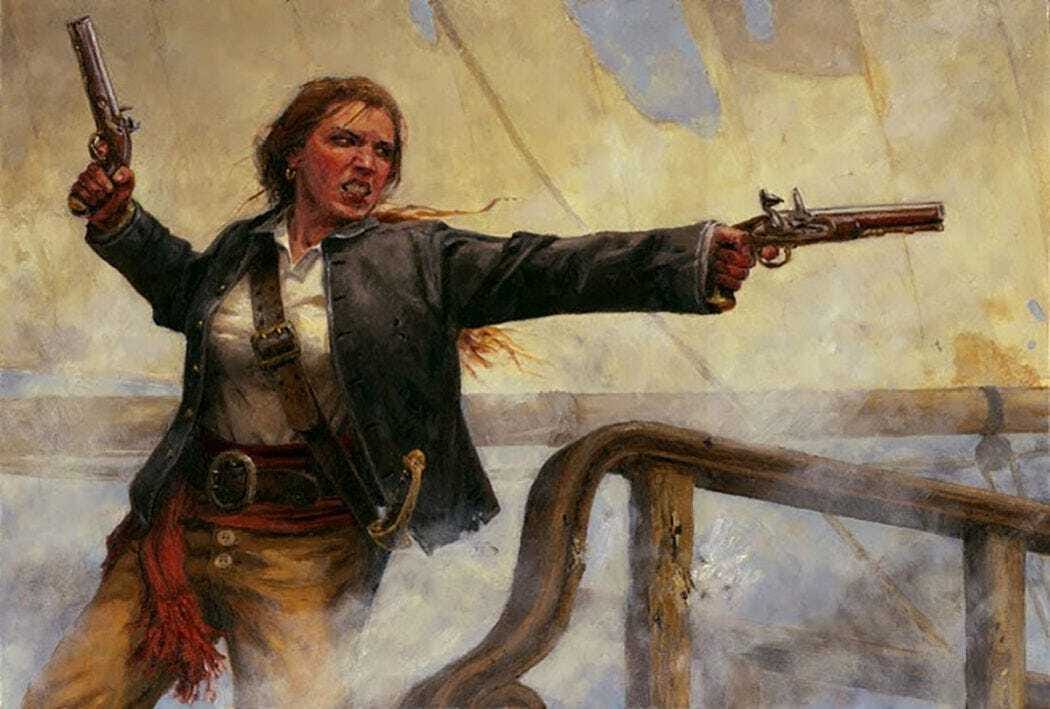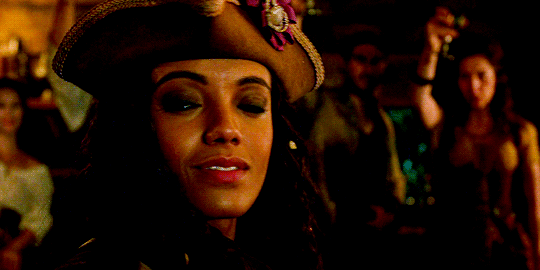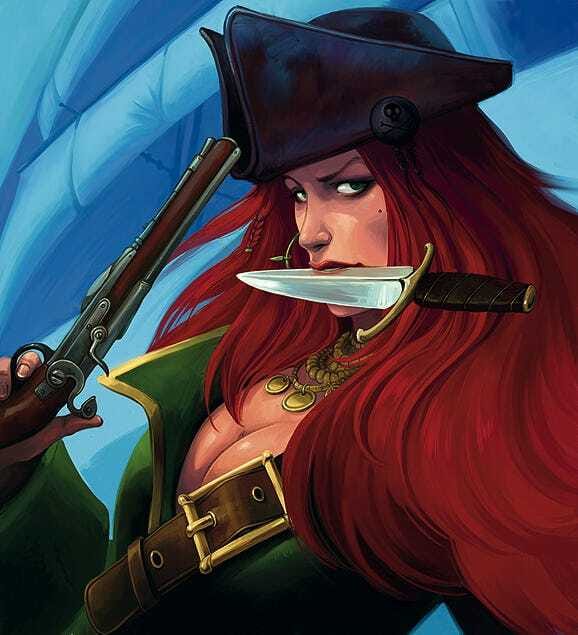The Caribbean sun beats down mercilessly on the deck of the Revenge, its rays catching the glint of steel and the flash of defiant eyes. Blood mingles with salt spray as cutlasses clash, and in the midst of this violent ballet dances a figure that would make the devil himself take notice—Anne Bonny, her red hair whipping like flames in the ocean wind, her blade singing its deadly song as she carves through enemies with the fury of a woman who has never, not once, apologized for who she fucking is.

This is no sanitized fairy tale of pirates and buried treasure. This is the raw, unvarnished truth of a woman who lived as she pleased, loved whom she chose, and fought like hell against every goddamn soul who tried to cage her spirit. Anne Bonny wasn't just a pirate—she was a revolution wrapped in leather and lace, a middle finger raised to every suffocating convention of her time, and a blazing torch of queer defiance centuries before the world had words for what she represented.
Born around 1697 in County Cork, Ireland, Anne Cormac entered a world that had already decided her fate before she drew her first breath. She was meant to be silent, subservient, and safely tucked away in the shadows of more "important" men. The patriarchal machine had clear expectations: marry young, breed often, and die quietly. But from her earliest days, Anne Bonny grabbed those expectations by the throat and strangled them with her bare hands.
Her father, William Cormac, was a lawyer who had knocked up the family maid—Anne's mother. In the rigid social hierarchy of 18th-century Ireland, this scandal should have destroyed them all. Instead, Cormac said "fuck it" to respectability, took his lover and bastard daughter, and sailed for the American colonies where they could start fresh. This act of defiance—choosing love over social standing—planted the first seeds of rebellion in young Anne's soul.
In Charleston, South Carolina, the Cormac family built a new life from scratch. William established a successful law practice and plantation, but it was clear from the start that his daughter was not cut from ordinary cloth. While other girls her age were learning needlepoint and practicing their curtsies, Anne was learning to ride like a demon, shoot like a marksman, and curse like a sailor. She moved through the world with a swagger that made proper ladies clutch their pearls and men wonder if they were seeing things.
The first whispers about Anne's unconventional nature started early. Servants gossiped about the young mistress who preferred the company of both the stable boys and the parlor maids with equal enthusiasm. They spoke in hushed tones about midnight escapades and passionate encounters that defied easy categorization. Anne Bonny was discovering that her heart and her loins recognized no boundaries when it came to attraction—a revelation that would have sent most people of her era scrambling for the nearest priest, but only made Anne more determined to live authentically.
When Anne was barely out of her teens, she shocked Charleston society by marrying James Bonny, a small-time pirate and fortune hunter who thought he could tame the wild Irish girl and claim her father's wealth. The poor bastard had no idea what he'd gotten himself into. Anne married him not out of love, but as a means of escape from her father's increasingly desperate attempts to marry her off to someone "respectable." It was a calculated move by a young woman who understood that sometimes you have to play the game to change the rules.
James Bonny turned out to be everything Anne despised—weak, grasping, and utterly conventional. While he dreamed of easy money and social climbing, Anne burned with restless energy and unfulfilled desires. Their marriage was a farce from the start, a prison that Anne was already planning to escape before the ink was dry on the wedding certificate.

The couple moved to Nassau in the Bahamas, a lawless pirate haven where conventional morality went to die and freedom could be bought with steel and courage. For James, Nassau represented opportunity for his petty schemes. For Anne, it was liberation incarnate—a place where she could finally breathe freely and explore every aspect of her complex sexuality without the suffocating weight of mainland propriety.
Nassau in the early 1700s was a powder keg of sexual and social revolution. Pirates, prostitutes, escaped slaves, and social outcasts from across the Atlantic world had created a society that operated by its own rules. Gender roles were fluid, sexual boundaries were negotiable, and survival depended on wit, strength, and ruthless determination—qualities Anne possessed in abundance.
It was in this intoxicating atmosphere that Anne first encountered other women who loved women, men who challenged traditional masculinity, and people who refused to be defined by society's narrow categories. She found herself drawn into passionate affairs with both men and women, sometimes simultaneously, always honestly. While the respectable world would have labeled her a whore or worse, in Nassau she was simply Anne—a woman living life on her own terms.
Her marriage to James became increasingly irrelevant as Anne explored her true nature. She took lovers as she pleased, fought alongside men as an equal, and began to develop the reputation that would make her legendary. Her bisexuality wasn't a phase or a rebellion—it was simply part of who she was, as natural and integral as her red hair or her fierce temper.
Everything changed when Anne met Captain John "Calico Jack" Rackham. Unlike her pathetic husband, Jack was a real pirate—charming, dangerous, and utterly unintimidated by Anne's fierce independence. More importantly, he saw her for what she truly was: not a woman to be tamed, but a force of nature to be unleashed. Their affair was passionate, public, and absolutely scandalous by any civilized standard.
But Anne Bonny was never one to do things halfway. When she decided to leave her husband for Calico Jack, she didn't sneak away in the night like a guilty adulteress. She walked out in broad daylight, her head held high, her hand on her cutlass, daring anyone to try and stop her. When James Bonny appealed to the colonial governor for the return of his "property," Anne's response was swift and brutal—she showed up at the governor's mansion armed to the teeth and made it clear that any attempt to drag her back to her miserable marriage would result in bloodshed.
Joining Calico Jack's crew aboard the Revenge was the moment Anne Bonny truly came alive. Here, finally, was a life that matched her spirit—dangerous, free, and absolutely uncompromising. She didn't join as Jack's woman or as some token female presence. She earned her place with blade and blood, proving herself in combat and command until even the most skeptical pirates acknowledged her as an equal.
The open ocean became Anne's cathedral, piracy her religion, and freedom her god. She reveled in the violent ballet of ship-to-ship combat, the intoxicating rush of victory, and the democratic brutality of pirate life where respect was earned through courage and cunning rather than birthright or gender. Her bisexuality continued to be an open secret among the crew—she took lovers as she pleased, both male and female, and anyone who had a problem with it could settle the matter with steel.
It was during this period that Anne encountered Mary Read, another woman living as a pirate in male disguise. Their meeting was electric—two fierce women who had refused to accept the limitations society tried to impose on them, finding kinship in the most unlikely of circumstances. While historical records are frustratingly vague about the exact nature of their relationship, the intensity of their bond was undeniable.
Some accounts suggest they were lovers, others insist they were simply close comrades, but the truth is likely more complex and more beautiful than either simple explanation. In Mary Read, Anne found someone who understood the cost of living authentically in a world determined to crush anyone who colored outside the lines. Whether their relationship was romantic, platonic, or something that defied easy categorization, it represented a profound connection between two extraordinary women who refused to be diminished.

The partnership between Anne, Mary, and Calico Jack created one of the most formidable pirate crews in Caribbean history. They terrorized merchant shipping with ruthless efficiency, their reputation spreading fear across the trade routes. But more than their success as pirates, they represented something revolutionary—a chosen family built on mutual respect, shared danger, and absolute loyalty that transcended traditional bonds of blood or marriage.
Anne's life as a pirate was a masterclass in living without apology. She fought with savage grace, loved with passionate intensity, and commanded respect through sheer force of personality. Her bisexuality wasn't hidden or apologized for—it was simply part of the complex tapestry of who she was. In an era when women were expected to be passive vessels for male ambition, Anne Bonny was a hurricane given human form.
The psychological impact of Anne Bonny's defiance cannot be overstated. In a world that sought to define women by their relationships to men—as daughters, wives, mothers, or whores—Anne created her own identity through action and choice. She loved both men and women not as a rejection of heteronormativity (a concept that wouldn't exist for centuries), but as a natural expression of her authentic self.
Her story resonated through the centuries, whispered in taverns and immortalized in ballads, because it represented something profoundly subversive: the possibility of a life lived entirely on one's own terms. For generations of LGBTQ+ people struggling against societal expectations and legal persecution, Anne Bonny became an inadvertent patron saint—proof that it was possible to be queer, dangerous, and absolutely unapologetic about both.
The philosophy Anne embodied was simple but revolutionary: authentic living requires the courage to reject false choices. When society insisted she choose between respectability and freedom, she chose freedom. When it demanded she pick between loving men or women, she refused to choose at all. When it tried to cage her spirit in the narrow confines of 18th-century femininity, she exploded those boundaries with cutlass and pistol.
But Anne's story is also a testament to the brutal costs of living authentically in a hostile world. Her career as a pirate was cut short in 1720 when their ship was captured by pirate hunters. While Calico Jack and most of the male crew were quickly tried and executed, Anne and Mary's pregnancies bought them temporary reprieve from the gallows.
The trial of Anne Bonny and Mary Read became a sensation, not just because of their piracy, but because their very existence challenged fundamental assumptions about gender, sexuality, and power. Court records show that Anne remained defiant to the end, reportedly telling the cowering Calico Jack before his execution: "Sorry to see you there, but if you had fought like a man, you would not have been hanged like a dog."
Mary Read died in prison, probably from fever, taking with her the secrets of her relationship with Anne and the full story of their extraordinary partnership. Anne's fate became one of history's tantalizing mysteries—some accounts suggest she was executed, others claim her father's influence secured her release, and still others whisper that she simply vanished back into the chaos of the Caribbean to live out her days in obscurity.
The uncertainty surrounding Anne's ultimate fate is perhaps fitting for a woman who consistently refused to be pinned down or defined by others' expectations. Like the best outlaws and revolutionaries, she became more powerful as a legend than she ever was as a living person.
For modern LGBTQ+ people, Anne Bonny represents something profoundly important: historical proof that queer people have always existed, have always fought for their right to love and live authentically, and have always found ways to create chosen families and communities even in the most hostile circumstances. Her story demolishes the lie that LGBTQ+ identities are modern inventions or temporary phases—Anne Bonny was living an openly bisexual life in the early 1700s with a confidence and authenticity that would be admirable in any era.
The social impact of Anne Bonny's legend extended far beyond her own lifetime. Her story became part of the folklore that sustained marginalized communities through centuries of oppression. When LGBTQ+ people were told they were sick, sinful, or unnatural, they could point to figures like Anne Bonny as proof that queer people had always been part of human history—not as victims or cautionary tales, but as heroes and legends.
The psychological effect of having historical figures who lived openly queer lives cannot be understated. For young people struggling with their identity, for adults facing discrimination, for anyone told that their love is wrong or their authentic self is unacceptable, Anne Bonny stands as a reminder that it's possible to live with courage, dignity, and absolute refusal to apologize for who you are.
Her story also highlights the intersection of multiple forms of oppression and resistance. As a woman in a patriarchal society, as someone who loved both men and women in a heteronormative world, as an Irish person in a British colonial system, Anne faced multiple layers of marginalization. Her response was to reject all attempts at categorization and to create her own path through sheer force of will.
The philosophical legacy of Anne Bonny extends beyond LGBTQ+ rights to encompass broader questions of authenticity, freedom, and the right to self-determination. Her life was a practical demonstration that it's possible to refuse false choices, to love without limits, and to fight against any force that tries to diminish your humanity.
In our current moment, when LGBTQ+ rights are under attack and bisexual people still face discrimination from both straight and gay communities, Anne Bonny's story remains urgently relevant. She represents the long history of bisexual people who refused to choose sides, who loved authentically across gender lines, and who demanded recognition as complete human beings rather than confused or indecisive half-measures.
Anne Bonny died as she lived—on her own terms, leaving behind a legacy that continues to inspire and challenge. She proved that it's possible to be queer and fierce, that authenticity is worth fighting for, and that love—in all its forms—is the most rebellious act of all. Her cutlass may have fallen silent centuries ago, but her spirit continues to slash through the bonds that try to limit human potential and queer joy.
Every time someone refuses to hide their authentic self, every time someone loves without apology, every time someone chooses freedom over respectability, they're following in the wake of Anne Bonny's ship. She remains what she always was—a force of nature, a revolution in human form, and proof that the queer spirit cannot be conquered, only temporarily suppressed before it explodes back into glorious, defiant life.
Citations
Nelson, J. 2004 “The Only Life That Mattered: The Short and Merry Lives of Anne Bonny, Mary Read, and Calico Jack” McBooks Press
Simon R. 2022 “Pirate Queens: The Lives of Anne Bonny & Mary Read”